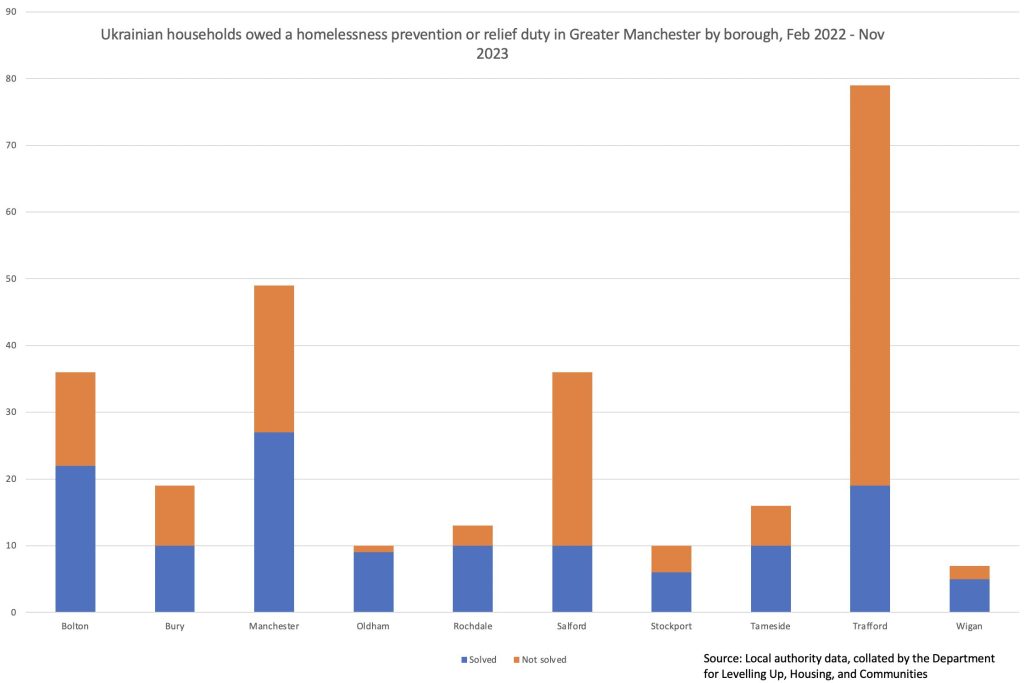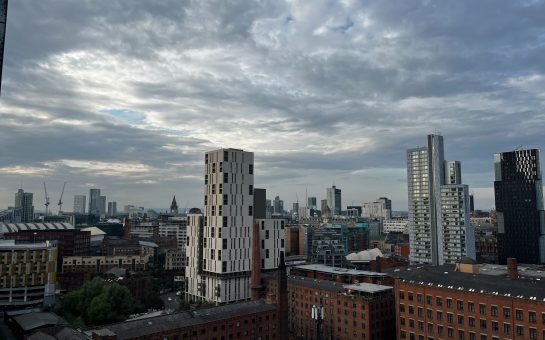Less than half of Ukrainian refugee homelessness cases in Greater Manchester have been resolved, local authority figures show.
Data collected by councils shows 275 Ukrainian households in Greater Manchester were homeless or at risk of homelessness between February 2022 and November 2023, including 172 families with children.
Only 128 of these households (46.6%) were successfully helped to remain in their home or find new accommodation – well below the national average of 64%.
Why are some Ukrainian refugees facing homelessness?
The UK has taken in over 190,000 Ukrainians since Russia’s invasion of the country in February 2022. Many of these arrived through the Homes for Ukraine Scheme, which saw members of the public open their spare rooms to those fleeing the conflict.
Although the scheme does give Ukrainian refugees a more streamlined route to accommodation than the general asylum system, living in some else’s home can take a toll on both parties.
“It creates a heavy burden on the host, to open your house to a refugee who’s fleeing a war-torn country,” said social policy researcher Richard Machin.
“It’s not really a sustainable arrangement on an ongoing basis.”
While the data records that a significant proportion of cases are due to host arrangements breaking down, the figures also include many Ukrainians who arrived on a family visa. The cause of homelessness pressures is also not recorded in all cases.
Where in Greater Manchester is the problem most acute?
Within Greater Manchester, Trafford has the highest rate of Ukrainian households experiencing homelessness pressures, with just 24.1% of cases in the borough having been resolved.
However, this is due at least in part to the sheer volume of Ukrainian homelessness cases in Trafford. Seventy-nine households needed assistance from the council: 30 more than in Manchester, and over twice as many as any other borough.

This means that despite having solved less than a quarter of cases in the borough, Trafford has provided more assistance than any borough except Bolton or Manchester.
“Often, hosts are going to be more privileged, middle class, more affluent people who’ve got accommodation that’s appropriate to accommodate a refugee,” explained Machin.
“Often they’re going to be in the better, more affluent areas of the country.
“When those arrangements come to an end, what we’re often seeing is that Ukrainian refugees have got work in that area, their children are going to be in school, and there’s just no way that they can then afford to carry on living there.”
What have the councils said?
Stockport Council said that it has focussed on minimising homelessness from the Homes for Ukraine by supporting host placements, and emphasised that the homelessness process is used only as a last resort.
A spokesperson said: “Stockport Council and Stockport Homes have focussed upon minimising homelessness from the Homes for Ukraine Scheme by supporting host placements and helping them move into private rented accommodation. Since the start of the Homes for Ukraine Scheme, 84 households have been rehoused, totalling 192 people.
“Of 10 households which unfortunately become temporarily homeless, it has often been for a short period as a private rented tenancy had been lined up.
“Support around accessing employment, benefits and bank accounts has helped offset some of the initial difficulties experienced, which included a lack of a credit and tenancy history in the UK.
“Host families have also been incredibly helpful in enabling people to become settled and get in a position to find longer term housing.”
The spokesperson added that Ukrainian homelessness reflects wider problems in housing – a point which Oldham Councillor Elaine Taylor, Cabinet Member for Housing, echoed:
“Housing is a basic human right – nobody should be homeless.
“Unfortunately, like many areas across the country, we are in a housing crisis and there aren’t enough houses to meet demand or enough social homes available to address the problem.
“Too many Oldhamers are struggling to afford to keep a roof over their heads, forcing them into temporary accommodation and homelessness. We are working hard to find the best solutions for people in this situation, including refugees from Ukraine, as we will not sit by and allow this to continue to happen.
“Housing is one of our key priorities – we need more and better housing right across the borough.
“In February we are holding a Housing Round Table event, bringing together key partners from Oldham’s housing sector, so we can work together to improve things.
“As a Council we’ve got a robust housing strategy and plans to build more houses, but the reality is that this Government make it incredibly hard for Council’s across the country to build the social housing that residents need.
“We’re working closely with housing associations to deliver more social homes but we acknowledge that this will not deliver to the number of houses Oldhamers need without Government action.
“If any resident in our borough is homeless, or is worried about their housing situation, please get advice from our Housing Options Service as soon as possible. Visit www.oldham.gov.uk/housing for more information.”
All Greater Manchester councils were approached for comment.



